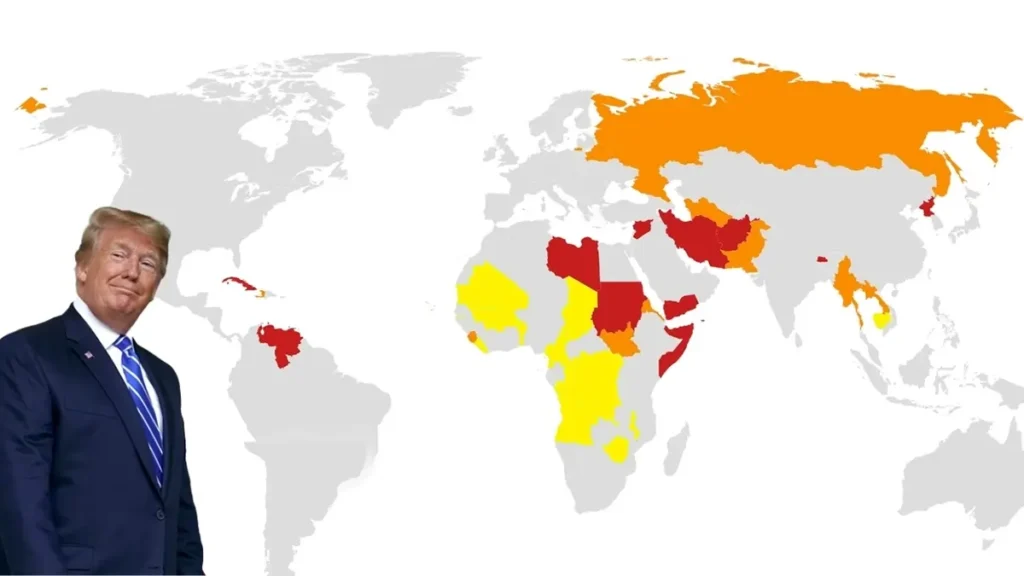
ممنوعیت جدید ورود ایرانیها به آمریکا 2025
به نقل از رویترز، دولت آمریکا به ریاست جمهوری دونالد ترامپ از تاریخ ۹ ژوئن ۲۰۲۵، ممنوعیت گستردهای را برای ورود شهروندان ۱۲ کشور از جمله ایران اجرایی میکند. این ممنوعیت علاوه بر ایران، شامل کشورهایی مانند افغانستان، لیبی، سومالی، سودان و یمن نیز میشود. دلیل اعلامشده توسط دولت آمریکا برای ممنوعیت جدید ورود ایرانیها به آمریکا، نگرانیهای امنیت ملی و ضعف در فرایندهای بررسی درخواست ویزا بوده است.
دولت ایالات متحده آمریکا از اجرای ممنوعیت و محدودیتهای گستردهتر برای ورود شهروندان ایرانی به خاک این کشور خبر داد؛ تصمیمی که به سرعت فضای خبری و شبکههای اجتماعی را تحت تاثیر قرار داد. بسیاری از ایرانیان داخل و خارج کشور این خبر را با نگرانی دنبال کردند و طی روزهای گذشته، شاهد حجم عظیمی از سوالات و ابهامات بودیم. در این گزارش، نگاهی موشکافانه به جزئیات ممنوعیت، پیامدها و چالشهای پیشرو خواهیم داشت و سعی میکنیم ابعاد مختلف این موضوع را با نگاهی بیطرفانه و تحلیلی بررسی کنیم.
جزئیات ممنوعیت جدید؛ چه تغییراتی رخ داده است؟
طبق بیانیه جدید وزارت امنیت داخلی آمریکا، صدور انواع روادید غیرمهاجرتی و حتی بسیاری از ویزاهای مهاجرتی برای ایرانیان، تا اطلاع ثانوی به شدت محدود خواهد بود؛ این محدودیتها عمدتاً شامل موارد زیر است:
-
- توقف صدور ویزاهای توریستی (B1/B2) برای عموم متقاضیان ایرانی
-
- محدودیت جدی بر پذیرش دانشجویان و پژوهشگران، حتی با دریافت پذیرش از مراکز معتبر علمی
-
- اختلال و سختگیری بیسابقه در مسیر اعطای ویزاهای خانوادگی
-
- افزایش سوالات و استعلامهای امنیتی برای موارد خاص (مثل دعوتهای پزشکی یا اضطراری)
حتی کسانی که روادید معتبر دارند، ممکن است هنگام ورود در فرودگاههای آمریکا با کنترلهای چندمرحلهای و اعلام برگشت به کشور مبدا روبرو شوند.
انگیزهها و دلایل تصمیم جدید دولت آمریکا
دولت ایالات متحده در اظهارنظر رسمی خود، «تشویشهای امنیتی» و «دگرگونیهای سیاسی منطقه» را از علل اصلی اعلام کرده است. اما صاحبنظران و کارشناسان معتقدند این تصمیم بیش از همه واکنشی به افزایش تنشهای سیاسی میان ایران و آمریکا در ماههای اخیر و نگرانی واشینگتن نسبت به فعالیتهای منطقهای ایران است.
همچنین برخی تحلیلگران بر این باورند که مسائلی مانند افزایش مهاجرت غیرقانونی، فعالیتهای سایبری و نگرانی نسبت به جاسوسی و امنیت ملی، دولت آمریکا را به سمت تصمیمات سختگیرانهتر سوق داده است.
پیامدهای ممنوعیت جدید برای ایرانیان

سرگردانی و بلاتکلیفی دانشجویان و پژوهشگران
هزاران جوان ایرانی هر ساله با امید به تحصیل در دانشگاههای معتبر آمریکا برای ویزا اقدام میکنند. اما این تصمیم ناگهانی مسیر زندگی بسیاری را تحت تاثیر قرار داده است. غالب دانشگاههای آمریکایی در چنین شرایطی، امکان تعویق پذیرش را فراهم میکنند اما راهحل قطعی و مناسبی وجود ندارد.
بحران دیدارهای خانوادگی و جداییهای طولانیمدت
یکی از بزرگترین نگرانیها، فاصله افتادن بین اعضای خانوادههای ایرانی-آمریکایی است. والدین، فرزندان و همسرانی که سالها دلخوش به دیدار دورهای بودند، اکنون با چشمانداز نامشخصی روبرو شدهاند.
آسیب به اکوسیستم تجاری و علمی ایران
فعالان اقتصادی و صاحبان کسبوکارهای فناورانه نیز از این ممنوعیت آسیب میبینند. بسیاری از کنفرانسها، نمایشگاهها و دورهها برای همکاریهای علمی، صنعتی و فناورانه عملاً غیر قابل دسترسی شدهاند.
ناامیدی عمومی و تبعات روانی
افزایش اضطراب، احساس بیعدالتی، نگرانی از آینده و موج جدید مهاجرت معکوس (تمایل به ترک برنامههای مهاجرتی یا جستوجوی مسیرهای دیگر) از پیامدهای روانی این تصمیم برای جامعه ایرانی است.
تأثیر ممنوعیت بر شهروندان ایرانی
ممنوعیت جدید ورود ایرانیها به آمریکا زندگی هزاران خانواده و فرد ایرانی را به شکل مستقیم و غیرمستقیم تحت تاثیر قرار میدهد. بسیاری از خانوادههایی که اعضای نزدیکشان در آمریکا حضور دارند، با دردسری دوچندان در دیدار و ملاقات با عزیزان خود روبهرو میشوند؛ دانشجویانی که مدتها در تدارک شروع ترم تحصیلی در دانشگاههای آمریکایی بودند، اکنون با آیندهای مبهم و بلاتکلیف مواجهاند. حتی آن دسته از ایرانیانی که سالها برای اخذ ویزاهای تخصصی، استارتآپی یا فرصتهای پژوهشی وقت و هزینه صرف کردند، حالا ناامید و متوقف ماندهاند. آسیب روانی، افزایش احساس بیعدالتی و موج جدیدی از مهاجرت به کشورهای جایگزین، مهمترین پیامدهای انسانی این تصمیم به شمار میآیند.
چالشهای حقوقی و واکنشها
این تصمیم تازه، چالش جدی برای ایرانیانی ایجاد کرده که یا در مسیر دریافت ویزا بودند یا حتی ویزای ورود به آمریکا را گرفتهاند. برخی از وکلا و فعالان حقوق مهاجرت با اشاره به نبود شفافیت کافی در دستورالعملهای اجرایی، نسبت به بلاتکلیفی متقاضیان هشدار دادهاند. بسیاری از خانوادهها درباره موارد استثنا و نحوه اعتراض اطلاع کافی ندارند و پروسههای طولانی و هزینهبر حقوقی به وجود آمده است. نهادها و گروههای مدافع حقوق بشر این اقدام را «تبعیضآمیز» و مغایر با اصول انسانی و بینالمللی دانستهاند و برخی دانشگاههای آمریکایی و اعضای کنگره نیز از دولت آمریکا درخواست بازنگری کردهاند.
تفاوت فرمان جدید ممنوعیت سفر با تراولبن ۲۰۱۷
تراولبن سال ۲۰۱۷ که با فرمان اجرایی رئیسجمهور وقت آمریکا وضع شد، شامل ممنوعیت موقت و مشروط ورود شهروندان چندین کشور مسلماننشین از جمله ایران بود، اما در عمل راههایی برای دریافت برخی ویزاهای دانشجویی و بشردوستانه باقی گذاشته بود. ممنوعیت جدید سال ۲۰۲۵ اما با شدت و جزئیات بیشتر، تمام انواع ویزاهای غیراضطراری را شامل میشود و گستره بیشتری از متقاضیان را دربرگرفته است. همچنین کنترلهای امنیتی و بررسی سوابق بسیار شدیدتر شده و بسیاری از استثناهای سابق اکنون حذف یا دشوارتر شدهاند.
سرنوشت ویزاهای معتبر پس از اجرای محدودیتها
افرادی که پیش از اجرای این ممنوعیت موفق به دریافت ویزای آمریکا شدهاند، با ابهام و نگرانی زیادی روبهرو هستند. طبق فرامین منتشرشده، حتی دارندگان ویزاهای معتبر هنگام ورود به آمریکا باید مراحل جدید کنترل امنیتی را بگذرانند و احتمال برگشت آنها از فرودگاه افزایشیافته است. همچنین برخی از سفارتها و کنسولگریها، ویزاهای صادرشده را تعلیق یا ابطال کردهاند. بنابراین، هیچ تضمینی برای ورود قطعی افراد با ویزای معتبر به خاک آمریکا وجود ندارد و به موارد خاص بستگی پلا دارد.
افراد معاف از ممنوعیت ورود به آمریکا
بر اساس اعلام مقامات آمریکایی و مفاد دستور جدید، گروه محدودی از شهروندان ایرانی همچنان میتوانند برای ورود به آمریکا اقدام کنند؛ این گروهها شامل موارد زیر هستند:
-
- افراد دارای اقامت دائم آمریکا (گرینکارتدارها)
-
- دارندگان تابعیت دوگانه با کشوری غیر از ایران و آمریکا (در برخی شرایط خاص)
-
- متقاضیان ویزاهای درمانی فوری یا بشردوستانه با مدارک پزشکی معتبر
-
- دیپلماتها یا اعضای سازمانهای بینالمللی با دعوتنامه رسمی
-
- افرادی که اثبات کنند جانشان در خطر واقعی قرار دارد (در پروندههای پناهندگی خاص)
سایر متقاضیان باید تا اطلاع ثانوی منتظر روشن شدن وضعیت جدید بمانند.
چه گزینههایی پیش روی ایرانیان قرار دارد؟
با توجه به شرایط تازه، ایرانیانی که علاقمند به مهاجرت، ادامه تحصیل یا تجارت بینالمللی هستند، ناچارند مسیرهای جایگزین را انتخاب کنند. کشورهای کانادا، آلمان، فرانسه، استرالیا و حتی ترکیه محبوبیت بیشتری یافتهاند و بسیاری از مؤسسات آموزشی این کشورها شرایط ویژه برای پذیرش دانشجویان ایرانی در نظر گرفتهاند. شرکت در برنامههای تحصیلی آنلاین، یا اپلای به دانشگاههای اروپایی و آسیایی که تعامل با آمریکا را ندارند نیز از جمله انتخابهای عاقلانه است.
همچنین کارشناسان توصیه میکنند از هرگونه اقدام غیرقانونی، وعدههای بیپشتوانه شرکتهای سودجو یا اعتماد به شایعات مهاجرتی پرهیز شود و افراد صرفاً به منابع رسمی مثل سایت سفارتها یا دفاتر حقوقی معتبر مراجعه نمایند تا در دام خسارتهای جدی نیفتند.
جمعبندی
ممنوعیت ورود ایرانیان به آمریکا در سال ۲۰۲۵ یک تصمیم مهم و تاثیرگذار است که زندگی هزاران فرد را دگرگون خواهد کرد. اطلاعرسانی صحیح، نیاز به صبر و ارزیابی گزینههای جایگزین، و پیگیری اخبار موثق بهترین راه برای عبور از این دوران سخت است. جامعه ایرانی باید با اتحاد و حمایت از یکدیگر و دوری از تصمیمات شتابزده، مسیر آینده را عاقلانهتر انتخاب کند.
سوالات متداول درباره ممنوعیت جدید ورود ایرانیها به آمریکا (۲۰۲۵)
۱. این ممنوعیت دقیقا شامل چه کسانی میشود؟
این ممنوعیت تقریباً همه شهروندان ایرانی متقاضی ویزاهای توریستی، دانشجویی، تجاری و خانوادگی را شامل میشود. بعضی گروهها مثل دارندگان گرینکارت، تابعیت دوگانه و متقاضیان ویزای درمانی اضطراری از این قانون مستثنا هستند، اما این موارد هم نیازمند بررسیهای ویژه و تایید نهایی سفارت و مرزبانان است.
۲. اگر کسی قبلاً ویزا گرفته و اکنون معتبر است، میتواند وارد آمریکا شود؟
خیر، صدور ویزا به معنی ورود تضمینشده نیست. حتی اگر ویزا دارید، ممکن است هنگام ورود به خاک آمریکا در فرودگاه با کنترلهای امنیتی شدید یا حتی برگشت به ایران مواجه شوید. بهتر است پیش از سفر با سفارت آمریکا در کشور ثالث تماس بگیرید و وضعیت خود را دقیق بررسی کنید.
۳. آیا ایرانیان مقیم آمریکا هم برای ورود و خروج محدودیت دارند؟
افرادی که گرینکارت (اقامت دائم آمریکا) دارند، مشمول این ممنوعیت نیستند و فعلاً میتوانند به کشور تردد داشته باشند. اما دارندگان ویزاهای موقت (تحصیلی، کاری، غیره) در بازگشت با ریسک بیشتری روبهرو هستند و باید احتیاط کنند.
۴. آیا امکان اعتراض یا درخواست استثنا وجود دارد؟
در موارد خاص (مانند بیماریهای جدی، دعوتنامه رسمی یا پروندههای بشردوستانه)، امکان ارائه درخواست برای استثنا به وجود دارد اما روند آن زمانبر، پیچیده و نیازمند مدارک قوی است. شانس پذیرش این موارد پایین است و هیچ تضمینی از سوی دولت آمریکا داده نشده است.
۵. تفاوت این ممنوعیت جدید با تراولبن ۲۰۱۷ چیست؟
تراولبن ۲۰۱۷ شامل دورههای زمانی محدود و برخی ویزاهای خاص میشد، اما در فرمان جدید سال ۲۰۲۵، دامنه ممنوعیت بسیار گستردهتر بوده و عملاً اکثر ویزاها (بهجز موارد اضطراری و معدود) را دربرمیگیرد. همچنین سختگیریها و کنترلهای امنیتی افزایش یافته و فرآیند بررسی برای همه متقاضیان پیچیدهتر شده است.
۶. چه کشورهایی میتوانند گزینه جایگزین برای تحصیل یا مهاجرت باشند؟
کشورهایی نظیر کانادا، آلمان، استرالیا، فرانسه، ایتالیا، هلند و ترکیه از مهمترین گزینههای جایگزین هستند که هرساله هزاران دانشجو و مهاجر ایرانی را میپذیرند. شرایط هر کشور متفاوت است و لازم است متقاضی طبق سیاستهای همان کشور اقدام کند.
۷. چه اقداماتی برای متقاضیان و خانوادهها توصیه میشود؟
- پیگیری اخبار و دستورالعملهای جدید از منابع رسمی سفارتها و وزارت امور خارجه
- گرفتن مشاوره از دفاتر حقوقی معتبر و پرهیز از اعتماد به واسطههای غیررسمی
- بررسی و آمادهسازی سایر مسیرهای مهاجرت تحصیلی یا کاری به کشورهای جایگزین
- عدم اقدام به روشهای غیرقانونی برای ورود به آمریکا یا خرید ویزای جعلی
۸. آیا افرادی که در پروسه مهاجرت هستند (مثل کیس پناهندگی) با این ممنوعیت مواجهاند؟
افرادی که پروندههای پناهندگی یا مهاجرت قبولی دارند، معمولاً بررسی خاص خود را دارند. اما روند رسیدگی و صدور ویزاهای مربوط، تأخیرها و مشکلات زیادی پیدا کرده و باید صبر و پیگیری بیشتری داشته باشند.
۹. این ممنوعیت تا چه زمانی ادامه دارد؟ آیا امکان لغو آن وجود دارد؟
این ممنوعیت فعلاً تا اطلاع ثانوی برقرار است و زمان پایان مشخصی ندارد. هرگونه تغییر در این قانون وابسته به تحولات سیاسی و احتمالا فشارهای حقوق بشری یا تغییر دولت آمریکا در آینده خواهد بود.
۱۰. آیا سفر به کشورهای دیگر (نظیر کانادا یا اروپا) هم بعد از این ممنوعیت دشوار میشود؟
نه، این ممنوعیت اختصاصاً از سوی دولت آمریکا وضع شده و شامل سیاست مهاجرتی کشورهای دیگر نیست. با این حال، برخی کشورهای اروپایی ممکن است به جهت همکاریهای امنیتی سختگیریهای بیشتری اعمال کنند اما هیچ ممنوعیت رسمی اعلام نشده است.



